Biology Essay: Lifestyle Factors Influencing Health and Diabetes
VerifiedAdded on 2023/05/29
|9
|2797
|349
Essay
AI Summary
This essay delves into the intricate relationship between lifestyle factors and their impact on health, with a specific focus on diabetes. It begins by defining health as a state of complete physical, mental, and social well-being, emphasizing the importance of lifestyle choices in maintaining good health and preventing chronic diseases. The essay discusses the classification of diseases and the role of epidemiology in understanding the causes and prevention of diseases, particularly diabetes. It highlights the significance of lifestyle management, including diet, exercise, and avoiding harmful habits like smoking and excessive alcohol consumption, in both maintaining overall health and preventing the development or progression of diabetes. The essay concludes by emphasizing the need for education and awareness to promote healthy lifestyle choices and prevent the growing epidemic of diabetes.

Running Head: BIOLOGY
0
Biology
11/24/2018
0
Biology
11/24/2018
Paraphrase This Document
Need a fresh take? Get an instant paraphrase of this document with our AI Paraphraser
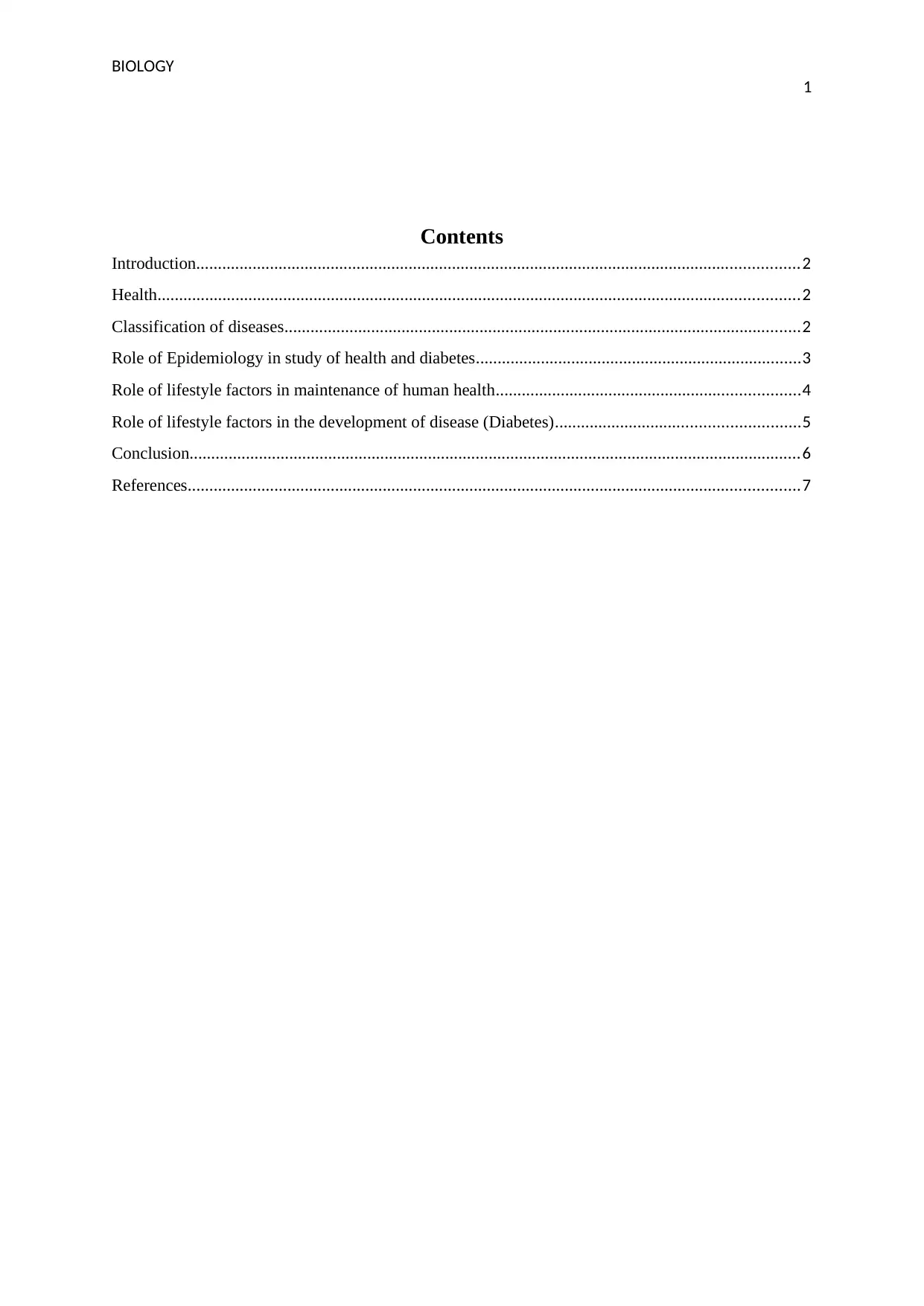
BIOLOGY
1
Contents
Introduction...........................................................................................................................................2
Health....................................................................................................................................................2
Classification of diseases.......................................................................................................................2
Role of Epidemiology in study of health and diabetes...........................................................................3
Role of lifestyle factors in maintenance of human health......................................................................4
Role of lifestyle factors in the development of disease (Diabetes)........................................................5
Conclusion.............................................................................................................................................6
References.............................................................................................................................................7
1
Contents
Introduction...........................................................................................................................................2
Health....................................................................................................................................................2
Classification of diseases.......................................................................................................................2
Role of Epidemiology in study of health and diabetes...........................................................................3
Role of lifestyle factors in maintenance of human health......................................................................4
Role of lifestyle factors in the development of disease (Diabetes)........................................................5
Conclusion.............................................................................................................................................6
References.............................................................................................................................................7
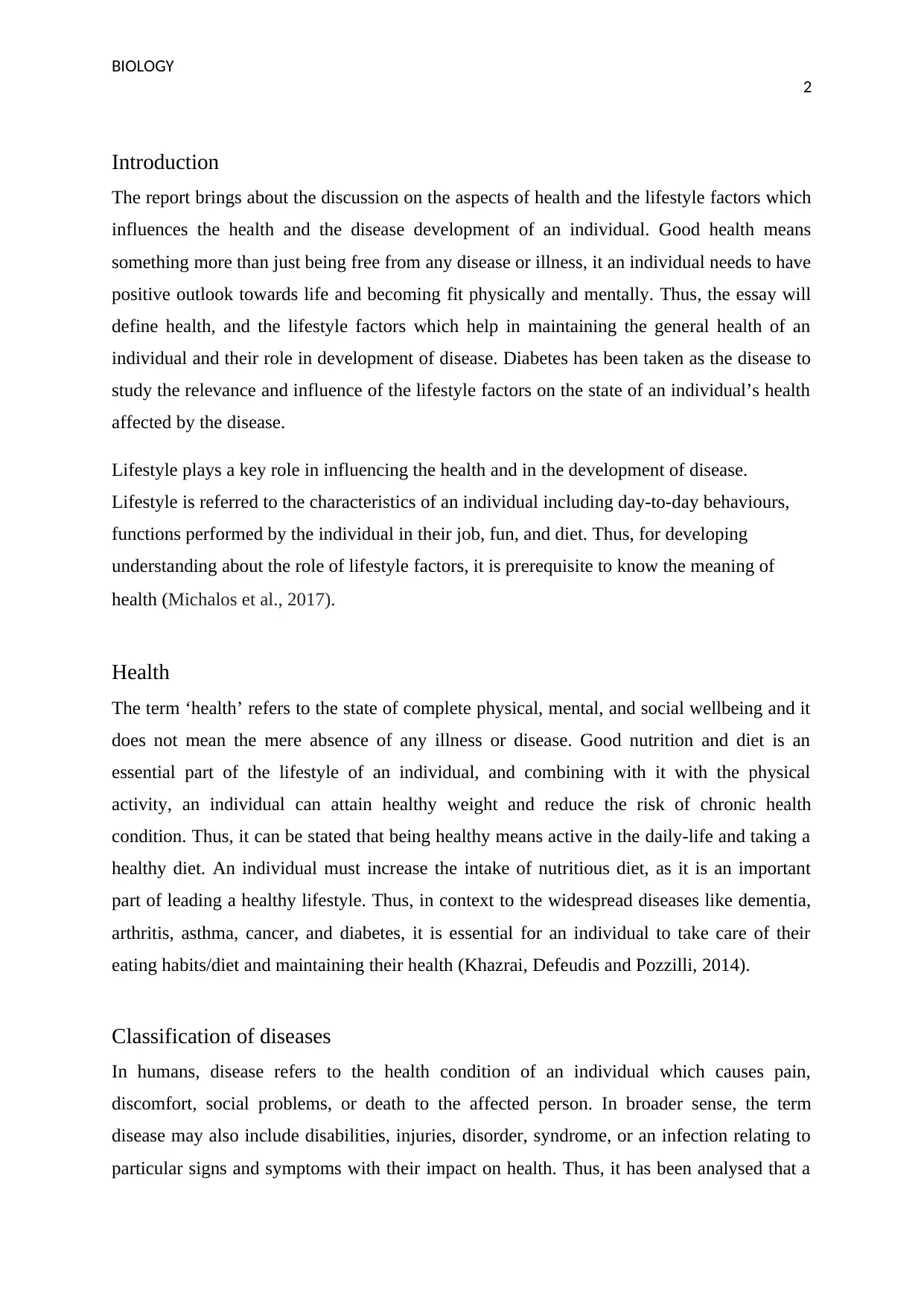
BIOLOGY
2
Introduction
The report brings about the discussion on the aspects of health and the lifestyle factors which
influences the health and the disease development of an individual. Good health means
something more than just being free from any disease or illness, it an individual needs to have
positive outlook towards life and becoming fit physically and mentally. Thus, the essay will
define health, and the lifestyle factors which help in maintaining the general health of an
individual and their role in development of disease. Diabetes has been taken as the disease to
study the relevance and influence of the lifestyle factors on the state of an individual’s health
affected by the disease.
Lifestyle plays a key role in influencing the health and in the development of disease.
Lifestyle is referred to the characteristics of an individual including day-to-day behaviours,
functions performed by the individual in their job, fun, and diet. Thus, for developing
understanding about the role of lifestyle factors, it is prerequisite to know the meaning of
health (Michalos et al., 2017).
Health
The term ‘health’ refers to the state of complete physical, mental, and social wellbeing and it
does not mean the mere absence of any illness or disease. Good nutrition and diet is an
essential part of the lifestyle of an individual, and combining with it with the physical
activity, an individual can attain healthy weight and reduce the risk of chronic health
condition. Thus, it can be stated that being healthy means active in the daily-life and taking a
healthy diet. An individual must increase the intake of nutritious diet, as it is an important
part of leading a healthy lifestyle. Thus, in context to the widespread diseases like dementia,
arthritis, asthma, cancer, and diabetes, it is essential for an individual to take care of their
eating habits/diet and maintaining their health (Khazrai, Defeudis and Pozzilli, 2014).
Classification of diseases
In humans, disease refers to the health condition of an individual which causes pain,
discomfort, social problems, or death to the affected person. In broader sense, the term
disease may also include disabilities, injuries, disorder, syndrome, or an infection relating to
particular signs and symptoms with their impact on health. Thus, it has been analysed that a
2
Introduction
The report brings about the discussion on the aspects of health and the lifestyle factors which
influences the health and the disease development of an individual. Good health means
something more than just being free from any disease or illness, it an individual needs to have
positive outlook towards life and becoming fit physically and mentally. Thus, the essay will
define health, and the lifestyle factors which help in maintaining the general health of an
individual and their role in development of disease. Diabetes has been taken as the disease to
study the relevance and influence of the lifestyle factors on the state of an individual’s health
affected by the disease.
Lifestyle plays a key role in influencing the health and in the development of disease.
Lifestyle is referred to the characteristics of an individual including day-to-day behaviours,
functions performed by the individual in their job, fun, and diet. Thus, for developing
understanding about the role of lifestyle factors, it is prerequisite to know the meaning of
health (Michalos et al., 2017).
Health
The term ‘health’ refers to the state of complete physical, mental, and social wellbeing and it
does not mean the mere absence of any illness or disease. Good nutrition and diet is an
essential part of the lifestyle of an individual, and combining with it with the physical
activity, an individual can attain healthy weight and reduce the risk of chronic health
condition. Thus, it can be stated that being healthy means active in the daily-life and taking a
healthy diet. An individual must increase the intake of nutritious diet, as it is an important
part of leading a healthy lifestyle. Thus, in context to the widespread diseases like dementia,
arthritis, asthma, cancer, and diabetes, it is essential for an individual to take care of their
eating habits/diet and maintaining their health (Khazrai, Defeudis and Pozzilli, 2014).
Classification of diseases
In humans, disease refers to the health condition of an individual which causes pain,
discomfort, social problems, or death to the affected person. In broader sense, the term
disease may also include disabilities, injuries, disorder, syndrome, or an infection relating to
particular signs and symptoms with their impact on health. Thus, it has been analysed that a
⊘ This is a preview!⊘
Do you want full access?
Subscribe today to unlock all pages.

Trusted by 1+ million students worldwide
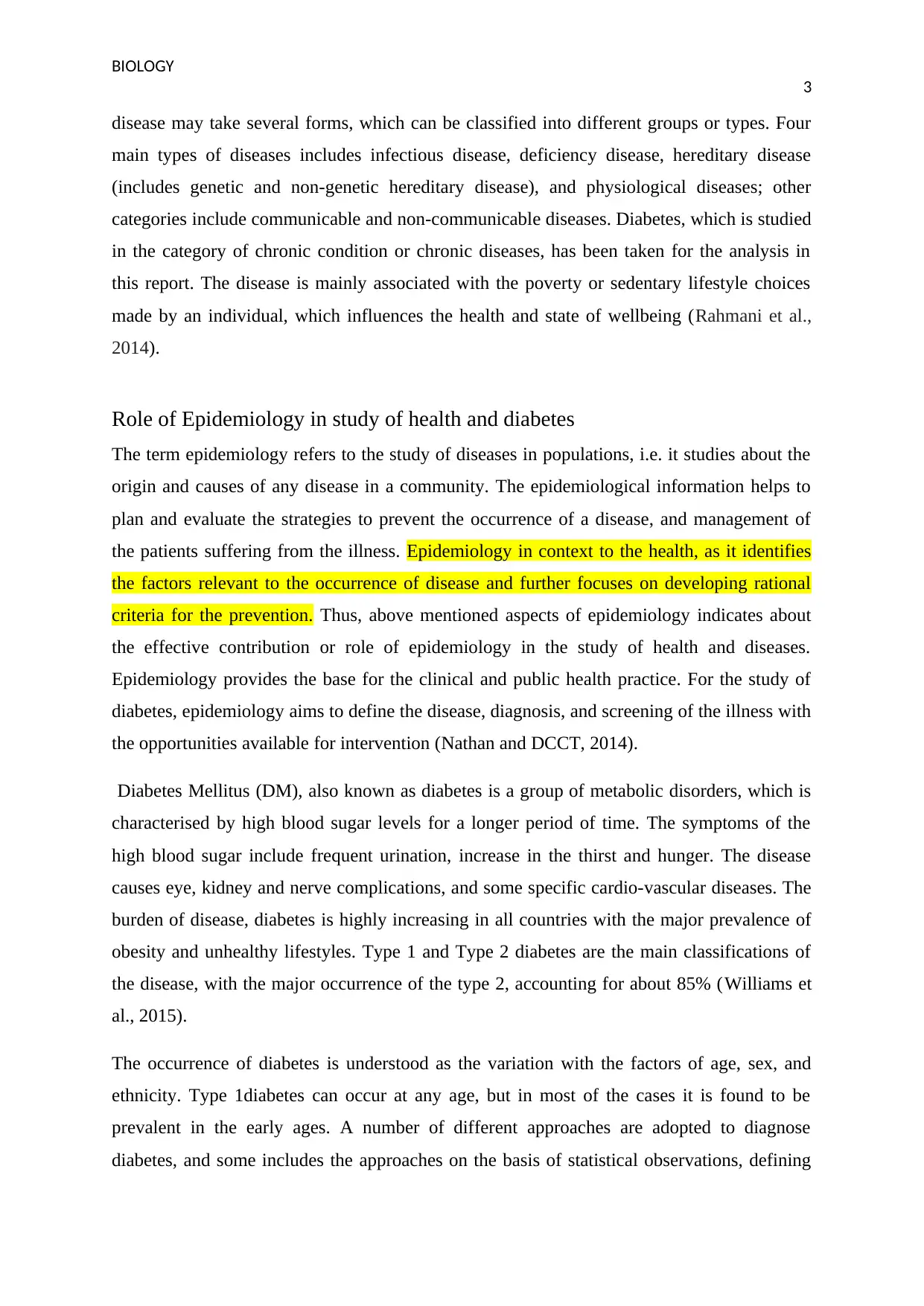
BIOLOGY
3
disease may take several forms, which can be classified into different groups or types. Four
main types of diseases includes infectious disease, deficiency disease, hereditary disease
(includes genetic and non-genetic hereditary disease), and physiological diseases; other
categories include communicable and non-communicable diseases. Diabetes, which is studied
in the category of chronic condition or chronic diseases, has been taken for the analysis in
this report. The disease is mainly associated with the poverty or sedentary lifestyle choices
made by an individual, which influences the health and state of wellbeing (Rahmani et al.,
2014).
Role of Epidemiology in study of health and diabetes
The term epidemiology refers to the study of diseases in populations, i.e. it studies about the
origin and causes of any disease in a community. The epidemiological information helps to
plan and evaluate the strategies to prevent the occurrence of a disease, and management of
the patients suffering from the illness. Epidemiology in context to the health, as it identifies
the factors relevant to the occurrence of disease and further focuses on developing rational
criteria for the prevention. Thus, above mentioned aspects of epidemiology indicates about
the effective contribution or role of epidemiology in the study of health and diseases.
Epidemiology provides the base for the clinical and public health practice. For the study of
diabetes, epidemiology aims to define the disease, diagnosis, and screening of the illness with
the opportunities available for intervention (Nathan and DCCT, 2014).
Diabetes Mellitus (DM), also known as diabetes is a group of metabolic disorders, which is
characterised by high blood sugar levels for a longer period of time. The symptoms of the
high blood sugar include frequent urination, increase in the thirst and hunger. The disease
causes eye, kidney and nerve complications, and some specific cardio-vascular diseases. The
burden of disease, diabetes is highly increasing in all countries with the major prevalence of
obesity and unhealthy lifestyles. Type 1 and Type 2 diabetes are the main classifications of
the disease, with the major occurrence of the type 2, accounting for about 85% (Williams et
al., 2015).
The occurrence of diabetes is understood as the variation with the factors of age, sex, and
ethnicity. Type 1diabetes can occur at any age, but in most of the cases it is found to be
prevalent in the early ages. A number of different approaches are adopted to diagnose
diabetes, and some includes the approaches on the basis of statistical observations, defining
3
disease may take several forms, which can be classified into different groups or types. Four
main types of diseases includes infectious disease, deficiency disease, hereditary disease
(includes genetic and non-genetic hereditary disease), and physiological diseases; other
categories include communicable and non-communicable diseases. Diabetes, which is studied
in the category of chronic condition or chronic diseases, has been taken for the analysis in
this report. The disease is mainly associated with the poverty or sedentary lifestyle choices
made by an individual, which influences the health and state of wellbeing (Rahmani et al.,
2014).
Role of Epidemiology in study of health and diabetes
The term epidemiology refers to the study of diseases in populations, i.e. it studies about the
origin and causes of any disease in a community. The epidemiological information helps to
plan and evaluate the strategies to prevent the occurrence of a disease, and management of
the patients suffering from the illness. Epidemiology in context to the health, as it identifies
the factors relevant to the occurrence of disease and further focuses on developing rational
criteria for the prevention. Thus, above mentioned aspects of epidemiology indicates about
the effective contribution or role of epidemiology in the study of health and diseases.
Epidemiology provides the base for the clinical and public health practice. For the study of
diabetes, epidemiology aims to define the disease, diagnosis, and screening of the illness with
the opportunities available for intervention (Nathan and DCCT, 2014).
Diabetes Mellitus (DM), also known as diabetes is a group of metabolic disorders, which is
characterised by high blood sugar levels for a longer period of time. The symptoms of the
high blood sugar include frequent urination, increase in the thirst and hunger. The disease
causes eye, kidney and nerve complications, and some specific cardio-vascular diseases. The
burden of disease, diabetes is highly increasing in all countries with the major prevalence of
obesity and unhealthy lifestyles. Type 1 and Type 2 diabetes are the main classifications of
the disease, with the major occurrence of the type 2, accounting for about 85% (Williams et
al., 2015).
The occurrence of diabetes is understood as the variation with the factors of age, sex, and
ethnicity. Type 1diabetes can occur at any age, but in most of the cases it is found to be
prevalent in the early ages. A number of different approaches are adopted to diagnose
diabetes, and some includes the approaches on the basis of statistical observations, defining
Paraphrase This Document
Need a fresh take? Get an instant paraphrase of this document with our AI Paraphraser
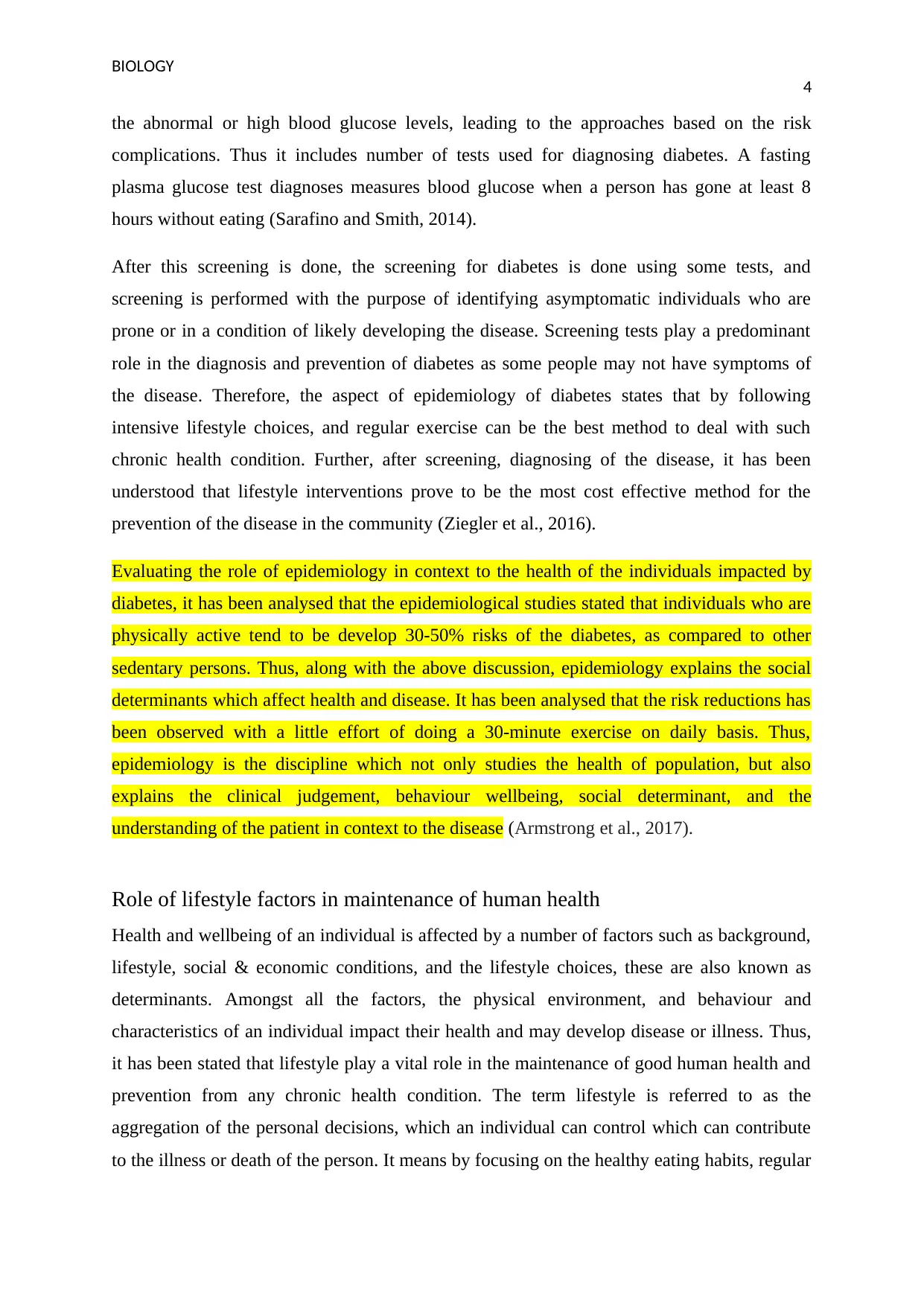
BIOLOGY
4
the abnormal or high blood glucose levels, leading to the approaches based on the risk
complications. Thus it includes number of tests used for diagnosing diabetes. A fasting
plasma glucose test diagnoses measures blood glucose when a person has gone at least 8
hours without eating (Sarafino and Smith, 2014).
After this screening is done, the screening for diabetes is done using some tests, and
screening is performed with the purpose of identifying asymptomatic individuals who are
prone or in a condition of likely developing the disease. Screening tests play a predominant
role in the diagnosis and prevention of diabetes as some people may not have symptoms of
the disease. Therefore, the aspect of epidemiology of diabetes states that by following
intensive lifestyle choices, and regular exercise can be the best method to deal with such
chronic health condition. Further, after screening, diagnosing of the disease, it has been
understood that lifestyle interventions prove to be the most cost effective method for the
prevention of the disease in the community (Ziegler et al., 2016).
Evaluating the role of epidemiology in context to the health of the individuals impacted by
diabetes, it has been analysed that the epidemiological studies stated that individuals who are
physically active tend to be develop 30-50% risks of the diabetes, as compared to other
sedentary persons. Thus, along with the above discussion, epidemiology explains the social
determinants which affect health and disease. It has been analysed that the risk reductions has
been observed with a little effort of doing a 30-minute exercise on daily basis. Thus,
epidemiology is the discipline which not only studies the health of population, but also
explains the clinical judgement, behaviour wellbeing, social determinant, and the
understanding of the patient in context to the disease (Armstrong et al., 2017).
Role of lifestyle factors in maintenance of human health
Health and wellbeing of an individual is affected by a number of factors such as background,
lifestyle, social & economic conditions, and the lifestyle choices, these are also known as
determinants. Amongst all the factors, the physical environment, and behaviour and
characteristics of an individual impact their health and may develop disease or illness. Thus,
it has been stated that lifestyle play a vital role in the maintenance of good human health and
prevention from any chronic health condition. The term lifestyle is referred to as the
aggregation of the personal decisions, which an individual can control which can contribute
to the illness or death of the person. It means by focusing on the healthy eating habits, regular
4
the abnormal or high blood glucose levels, leading to the approaches based on the risk
complications. Thus it includes number of tests used for diagnosing diabetes. A fasting
plasma glucose test diagnoses measures blood glucose when a person has gone at least 8
hours without eating (Sarafino and Smith, 2014).
After this screening is done, the screening for diabetes is done using some tests, and
screening is performed with the purpose of identifying asymptomatic individuals who are
prone or in a condition of likely developing the disease. Screening tests play a predominant
role in the diagnosis and prevention of diabetes as some people may not have symptoms of
the disease. Therefore, the aspect of epidemiology of diabetes states that by following
intensive lifestyle choices, and regular exercise can be the best method to deal with such
chronic health condition. Further, after screening, diagnosing of the disease, it has been
understood that lifestyle interventions prove to be the most cost effective method for the
prevention of the disease in the community (Ziegler et al., 2016).
Evaluating the role of epidemiology in context to the health of the individuals impacted by
diabetes, it has been analysed that the epidemiological studies stated that individuals who are
physically active tend to be develop 30-50% risks of the diabetes, as compared to other
sedentary persons. Thus, along with the above discussion, epidemiology explains the social
determinants which affect health and disease. It has been analysed that the risk reductions has
been observed with a little effort of doing a 30-minute exercise on daily basis. Thus,
epidemiology is the discipline which not only studies the health of population, but also
explains the clinical judgement, behaviour wellbeing, social determinant, and the
understanding of the patient in context to the disease (Armstrong et al., 2017).
Role of lifestyle factors in maintenance of human health
Health and wellbeing of an individual is affected by a number of factors such as background,
lifestyle, social & economic conditions, and the lifestyle choices, these are also known as
determinants. Amongst all the factors, the physical environment, and behaviour and
characteristics of an individual impact their health and may develop disease or illness. Thus,
it has been stated that lifestyle play a vital role in the maintenance of good human health and
prevention from any chronic health condition. The term lifestyle is referred to as the
aggregation of the personal decisions, which an individual can control which can contribute
to the illness or death of the person. It means by focusing on the healthy eating habits, regular
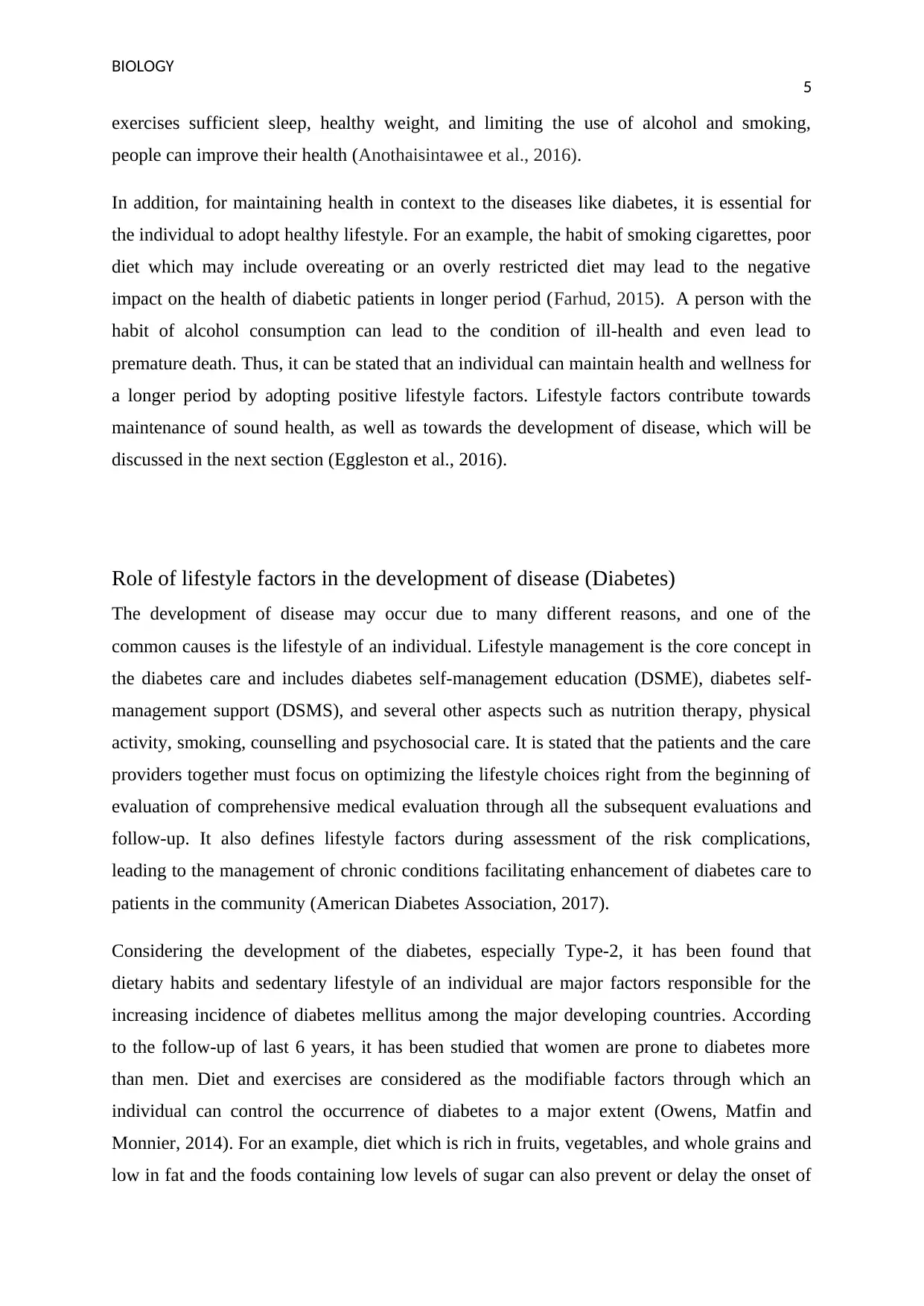
BIOLOGY
5
exercises sufficient sleep, healthy weight, and limiting the use of alcohol and smoking,
people can improve their health (Anothaisintawee et al., 2016).
In addition, for maintaining health in context to the diseases like diabetes, it is essential for
the individual to adopt healthy lifestyle. For an example, the habit of smoking cigarettes, poor
diet which may include overeating or an overly restricted diet may lead to the negative
impact on the health of diabetic patients in longer period (Farhud, 2015). A person with the
habit of alcohol consumption can lead to the condition of ill-health and even lead to
premature death. Thus, it can be stated that an individual can maintain health and wellness for
a longer period by adopting positive lifestyle factors. Lifestyle factors contribute towards
maintenance of sound health, as well as towards the development of disease, which will be
discussed in the next section (Eggleston et al., 2016).
Role of lifestyle factors in the development of disease (Diabetes)
The development of disease may occur due to many different reasons, and one of the
common causes is the lifestyle of an individual. Lifestyle management is the core concept in
the diabetes care and includes diabetes self-management education (DSME), diabetes self-
management support (DSMS), and several other aspects such as nutrition therapy, physical
activity, smoking, counselling and psychosocial care. It is stated that the patients and the care
providers together must focus on optimizing the lifestyle choices right from the beginning of
evaluation of comprehensive medical evaluation through all the subsequent evaluations and
follow-up. It also defines lifestyle factors during assessment of the risk complications,
leading to the management of chronic conditions facilitating enhancement of diabetes care to
patients in the community (American Diabetes Association, 2017).
Considering the development of the diabetes, especially Type-2, it has been found that
dietary habits and sedentary lifestyle of an individual are major factors responsible for the
increasing incidence of diabetes mellitus among the major developing countries. According
to the follow-up of last 6 years, it has been studied that women are prone to diabetes more
than men. Diet and exercises are considered as the modifiable factors through which an
individual can control the occurrence of diabetes to a major extent (Owens, Matfin and
Monnier, 2014). For an example, diet which is rich in fruits, vegetables, and whole grains and
low in fat and the foods containing low levels of sugar can also prevent or delay the onset of
5
exercises sufficient sleep, healthy weight, and limiting the use of alcohol and smoking,
people can improve their health (Anothaisintawee et al., 2016).
In addition, for maintaining health in context to the diseases like diabetes, it is essential for
the individual to adopt healthy lifestyle. For an example, the habit of smoking cigarettes, poor
diet which may include overeating or an overly restricted diet may lead to the negative
impact on the health of diabetic patients in longer period (Farhud, 2015). A person with the
habit of alcohol consumption can lead to the condition of ill-health and even lead to
premature death. Thus, it can be stated that an individual can maintain health and wellness for
a longer period by adopting positive lifestyle factors. Lifestyle factors contribute towards
maintenance of sound health, as well as towards the development of disease, which will be
discussed in the next section (Eggleston et al., 2016).
Role of lifestyle factors in the development of disease (Diabetes)
The development of disease may occur due to many different reasons, and one of the
common causes is the lifestyle of an individual. Lifestyle management is the core concept in
the diabetes care and includes diabetes self-management education (DSME), diabetes self-
management support (DSMS), and several other aspects such as nutrition therapy, physical
activity, smoking, counselling and psychosocial care. It is stated that the patients and the care
providers together must focus on optimizing the lifestyle choices right from the beginning of
evaluation of comprehensive medical evaluation through all the subsequent evaluations and
follow-up. It also defines lifestyle factors during assessment of the risk complications,
leading to the management of chronic conditions facilitating enhancement of diabetes care to
patients in the community (American Diabetes Association, 2017).
Considering the development of the diabetes, especially Type-2, it has been found that
dietary habits and sedentary lifestyle of an individual are major factors responsible for the
increasing incidence of diabetes mellitus among the major developing countries. According
to the follow-up of last 6 years, it has been studied that women are prone to diabetes more
than men. Diet and exercises are considered as the modifiable factors through which an
individual can control the occurrence of diabetes to a major extent (Owens, Matfin and
Monnier, 2014). For an example, diet which is rich in fruits, vegetables, and whole grains and
low in fat and the foods containing low levels of sugar can also prevent or delay the onset of
⊘ This is a preview!⊘
Do you want full access?
Subscribe today to unlock all pages.

Trusted by 1+ million students worldwide
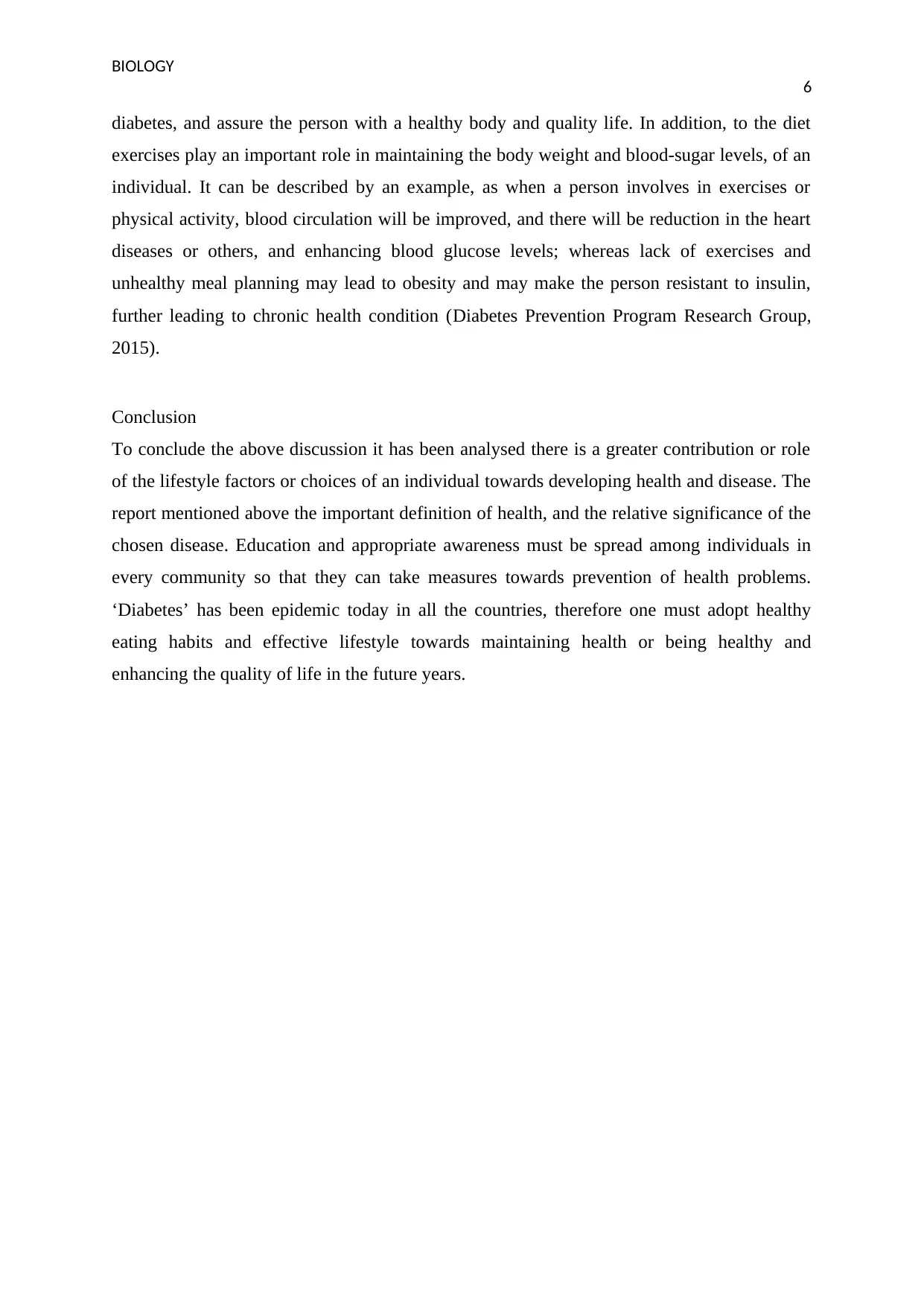
BIOLOGY
6
diabetes, and assure the person with a healthy body and quality life. In addition, to the diet
exercises play an important role in maintaining the body weight and blood-sugar levels, of an
individual. It can be described by an example, as when a person involves in exercises or
physical activity, blood circulation will be improved, and there will be reduction in the heart
diseases or others, and enhancing blood glucose levels; whereas lack of exercises and
unhealthy meal planning may lead to obesity and may make the person resistant to insulin,
further leading to chronic health condition (Diabetes Prevention Program Research Group,
2015).
Conclusion
To conclude the above discussion it has been analysed there is a greater contribution or role
of the lifestyle factors or choices of an individual towards developing health and disease. The
report mentioned above the important definition of health, and the relative significance of the
chosen disease. Education and appropriate awareness must be spread among individuals in
every community so that they can take measures towards prevention of health problems.
‘Diabetes’ has been epidemic today in all the countries, therefore one must adopt healthy
eating habits and effective lifestyle towards maintaining health or being healthy and
enhancing the quality of life in the future years.
6
diabetes, and assure the person with a healthy body and quality life. In addition, to the diet
exercises play an important role in maintaining the body weight and blood-sugar levels, of an
individual. It can be described by an example, as when a person involves in exercises or
physical activity, blood circulation will be improved, and there will be reduction in the heart
diseases or others, and enhancing blood glucose levels; whereas lack of exercises and
unhealthy meal planning may lead to obesity and may make the person resistant to insulin,
further leading to chronic health condition (Diabetes Prevention Program Research Group,
2015).
Conclusion
To conclude the above discussion it has been analysed there is a greater contribution or role
of the lifestyle factors or choices of an individual towards developing health and disease. The
report mentioned above the important definition of health, and the relative significance of the
chosen disease. Education and appropriate awareness must be spread among individuals in
every community so that they can take measures towards prevention of health problems.
‘Diabetes’ has been epidemic today in all the countries, therefore one must adopt healthy
eating habits and effective lifestyle towards maintaining health or being healthy and
enhancing the quality of life in the future years.
Paraphrase This Document
Need a fresh take? Get an instant paraphrase of this document with our AI Paraphraser
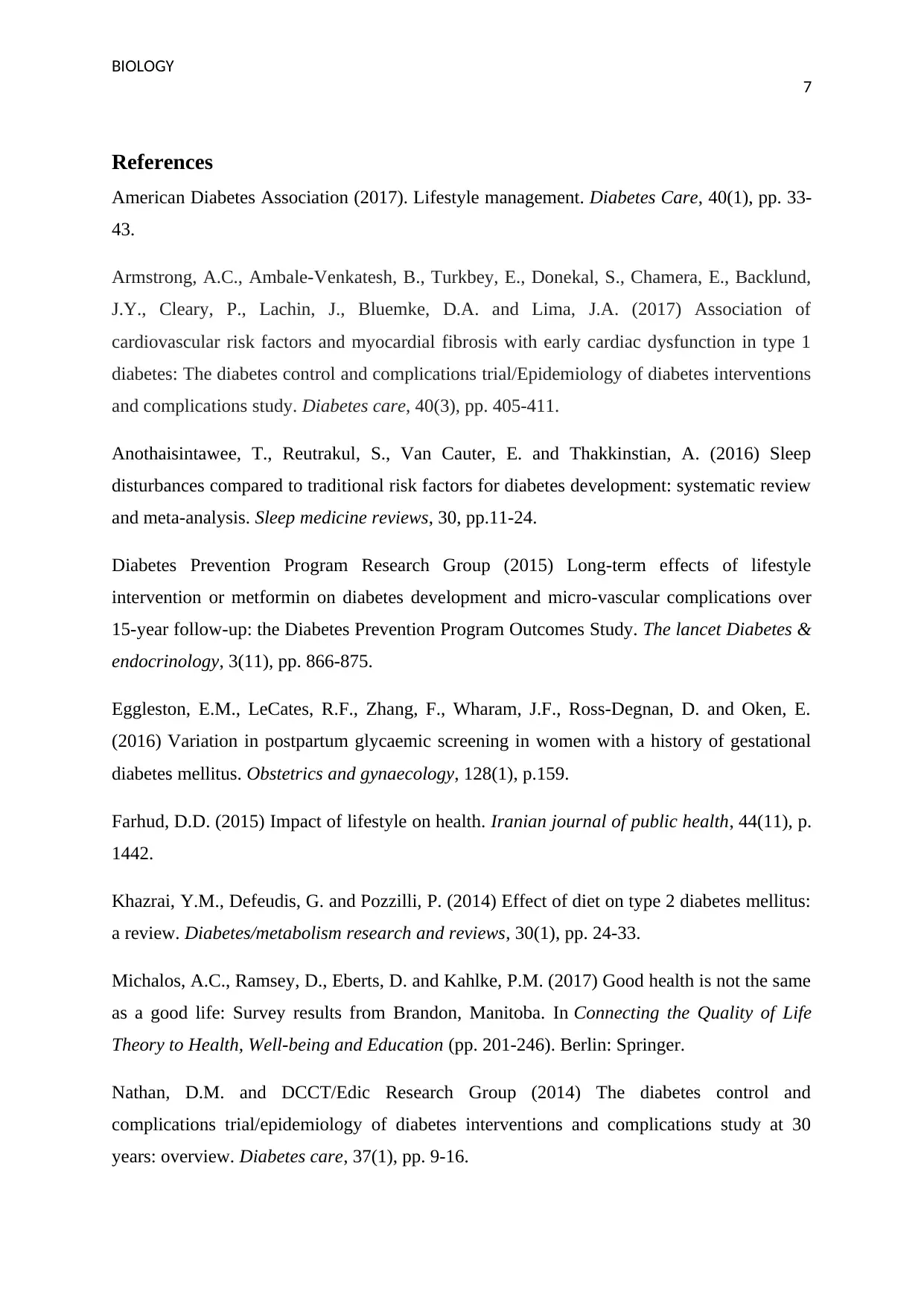
BIOLOGY
7
References
American Diabetes Association (2017). Lifestyle management. Diabetes Care, 40(1), pp. 33-
43.
Armstrong, A.C., Ambale-Venkatesh, B., Turkbey, E., Donekal, S., Chamera, E., Backlund,
J.Y., Cleary, P., Lachin, J., Bluemke, D.A. and Lima, J.A. (2017) Association of
cardiovascular risk factors and myocardial fibrosis with early cardiac dysfunction in type 1
diabetes: The diabetes control and complications trial/Epidemiology of diabetes interventions
and complications study. Diabetes care, 40(3), pp. 405-411.
Anothaisintawee, T., Reutrakul, S., Van Cauter, E. and Thakkinstian, A. (2016) Sleep
disturbances compared to traditional risk factors for diabetes development: systematic review
and meta-analysis. Sleep medicine reviews, 30, pp.11-24.
Diabetes Prevention Program Research Group (2015) Long-term effects of lifestyle
intervention or metformin on diabetes development and micro-vascular complications over
15-year follow-up: the Diabetes Prevention Program Outcomes Study. The lancet Diabetes &
endocrinology, 3(11), pp. 866-875.
Eggleston, E.M., LeCates, R.F., Zhang, F., Wharam, J.F., Ross-Degnan, D. and Oken, E.
(2016) Variation in postpartum glycaemic screening in women with a history of gestational
diabetes mellitus. Obstetrics and gynaecology, 128(1), p.159.
Farhud, D.D. (2015) Impact of lifestyle on health. Iranian journal of public health, 44(11), p.
1442.
Khazrai, Y.M., Defeudis, G. and Pozzilli, P. (2014) Effect of diet on type 2 diabetes mellitus:
a review. Diabetes/metabolism research and reviews, 30(1), pp. 24-33.
Michalos, A.C., Ramsey, D., Eberts, D. and Kahlke, P.M. (2017) Good health is not the same
as a good life: Survey results from Brandon, Manitoba. In Connecting the Quality of Life
Theory to Health, Well-being and Education (pp. 201-246). Berlin: Springer.
Nathan, D.M. and DCCT/Edic Research Group (2014) The diabetes control and
complications trial/epidemiology of diabetes interventions and complications study at 30
years: overview. Diabetes care, 37(1), pp. 9-16.
7
References
American Diabetes Association (2017). Lifestyle management. Diabetes Care, 40(1), pp. 33-
43.
Armstrong, A.C., Ambale-Venkatesh, B., Turkbey, E., Donekal, S., Chamera, E., Backlund,
J.Y., Cleary, P., Lachin, J., Bluemke, D.A. and Lima, J.A. (2017) Association of
cardiovascular risk factors and myocardial fibrosis with early cardiac dysfunction in type 1
diabetes: The diabetes control and complications trial/Epidemiology of diabetes interventions
and complications study. Diabetes care, 40(3), pp. 405-411.
Anothaisintawee, T., Reutrakul, S., Van Cauter, E. and Thakkinstian, A. (2016) Sleep
disturbances compared to traditional risk factors for diabetes development: systematic review
and meta-analysis. Sleep medicine reviews, 30, pp.11-24.
Diabetes Prevention Program Research Group (2015) Long-term effects of lifestyle
intervention or metformin on diabetes development and micro-vascular complications over
15-year follow-up: the Diabetes Prevention Program Outcomes Study. The lancet Diabetes &
endocrinology, 3(11), pp. 866-875.
Eggleston, E.M., LeCates, R.F., Zhang, F., Wharam, J.F., Ross-Degnan, D. and Oken, E.
(2016) Variation in postpartum glycaemic screening in women with a history of gestational
diabetes mellitus. Obstetrics and gynaecology, 128(1), p.159.
Farhud, D.D. (2015) Impact of lifestyle on health. Iranian journal of public health, 44(11), p.
1442.
Khazrai, Y.M., Defeudis, G. and Pozzilli, P. (2014) Effect of diet on type 2 diabetes mellitus:
a review. Diabetes/metabolism research and reviews, 30(1), pp. 24-33.
Michalos, A.C., Ramsey, D., Eberts, D. and Kahlke, P.M. (2017) Good health is not the same
as a good life: Survey results from Brandon, Manitoba. In Connecting the Quality of Life
Theory to Health, Well-being and Education (pp. 201-246). Berlin: Springer.
Nathan, D.M. and DCCT/Edic Research Group (2014) The diabetes control and
complications trial/epidemiology of diabetes interventions and complications study at 30
years: overview. Diabetes care, 37(1), pp. 9-16.
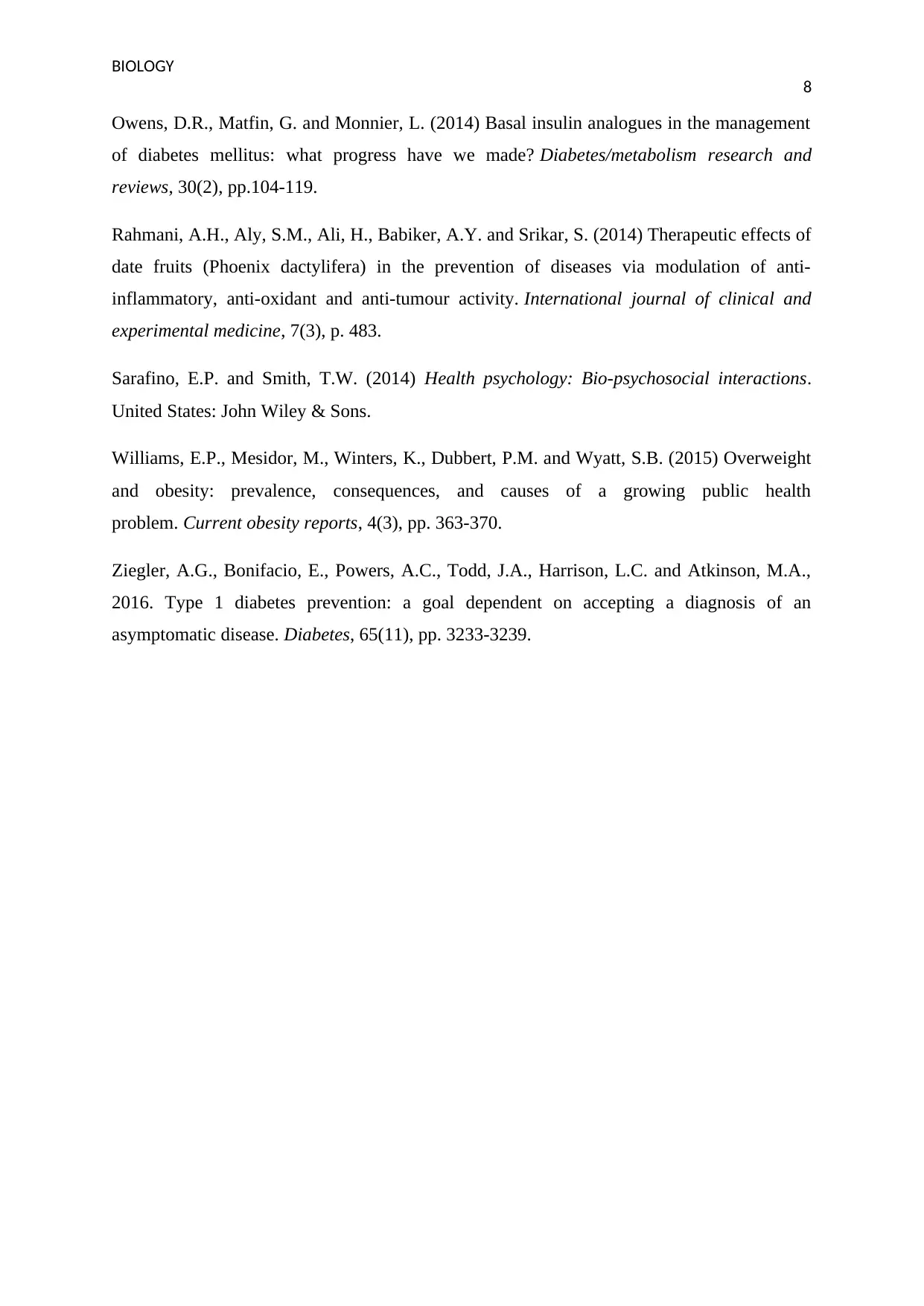
BIOLOGY
8
Owens, D.R., Matfin, G. and Monnier, L. (2014) Basal insulin analogues in the management
of diabetes mellitus: what progress have we made? Diabetes/metabolism research and
reviews, 30(2), pp.104-119.
Rahmani, A.H., Aly, S.M., Ali, H., Babiker, A.Y. and Srikar, S. (2014) Therapeutic effects of
date fruits (Phoenix dactylifera) in the prevention of diseases via modulation of anti-
inflammatory, anti-oxidant and anti-tumour activity. International journal of clinical and
experimental medicine, 7(3), p. 483.
Sarafino, E.P. and Smith, T.W. (2014) Health psychology: Bio-psychosocial interactions.
United States: John Wiley & Sons.
Williams, E.P., Mesidor, M., Winters, K., Dubbert, P.M. and Wyatt, S.B. (2015) Overweight
and obesity: prevalence, consequences, and causes of a growing public health
problem. Current obesity reports, 4(3), pp. 363-370.
Ziegler, A.G., Bonifacio, E., Powers, A.C., Todd, J.A., Harrison, L.C. and Atkinson, M.A.,
2016. Type 1 diabetes prevention: a goal dependent on accepting a diagnosis of an
asymptomatic disease. Diabetes, 65(11), pp. 3233-3239.
8
Owens, D.R., Matfin, G. and Monnier, L. (2014) Basal insulin analogues in the management
of diabetes mellitus: what progress have we made? Diabetes/metabolism research and
reviews, 30(2), pp.104-119.
Rahmani, A.H., Aly, S.M., Ali, H., Babiker, A.Y. and Srikar, S. (2014) Therapeutic effects of
date fruits (Phoenix dactylifera) in the prevention of diseases via modulation of anti-
inflammatory, anti-oxidant and anti-tumour activity. International journal of clinical and
experimental medicine, 7(3), p. 483.
Sarafino, E.P. and Smith, T.W. (2014) Health psychology: Bio-psychosocial interactions.
United States: John Wiley & Sons.
Williams, E.P., Mesidor, M., Winters, K., Dubbert, P.M. and Wyatt, S.B. (2015) Overweight
and obesity: prevalence, consequences, and causes of a growing public health
problem. Current obesity reports, 4(3), pp. 363-370.
Ziegler, A.G., Bonifacio, E., Powers, A.C., Todd, J.A., Harrison, L.C. and Atkinson, M.A.,
2016. Type 1 diabetes prevention: a goal dependent on accepting a diagnosis of an
asymptomatic disease. Diabetes, 65(11), pp. 3233-3239.
⊘ This is a preview!⊘
Do you want full access?
Subscribe today to unlock all pages.

Trusted by 1+ million students worldwide
1 out of 9
Related Documents
Your All-in-One AI-Powered Toolkit for Academic Success.
+13062052269
info@desklib.com
Available 24*7 on WhatsApp / Email
![[object Object]](/_next/static/media/star-bottom.7253800d.svg)
Unlock your academic potential
Copyright © 2020–2026 A2Z Services. All Rights Reserved. Developed and managed by ZUCOL.





